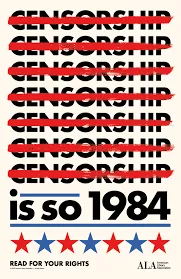
Censorship is so 1984
Censorship is so 1984
By Toni McGee October 10, 2025
“All these people talk so eloquently about getting back to good old-fashioned values. Well, as an old poop I can remember back to when we had those old-fashioned values, and I say let's get back to the good old-fashioned First Amendment of the good old-fashioned Constitution of the United States -- and to hell with the censors! Give me knowledge or give me death!” ― Kurt Vonnegut

National Book Banning Week
Censorship takes all kinds of formats, but the most common that has been taking place in our public libraries and our public schools, is book banning. Why is that? Why is it that people feel threatened by words on a page that they feel the need to “protect” our kids from what they MAY check out in the library or see in a classroom?
I remember teaching The Adventures of Huckleberry Finn, a classic, knowing that it’s been a banned book for a century – and why? Many will suggest that it’s because of the use of the “N” word, written by Mark Twain. My method of instruction for reading books from the early 20th century, specifically written about African American characters is to NOT say aloud a word that is offensive. Reading it quietly to ourselves is another thing. And if you’ve ever read Huck Finn, you’ll remember that Jim, Huck’s friend, is a runaway slave, who speaks in his African American dialect from the South. It takes a hot minute to try to decipher Jim’s vernacular, but like Shakespeare, once you read it a while, you begin to understand the language.

Many books that we’ve read in school are now considered offensive to read: 1984, Animal Farm, To Kill a Mockingbird, The Outsiders, many short stories and novels by Twain, Fahrenheit 451, The Help, Beloved, to name a few. When I’ve taught these books, it’s with these questions in mind – who wrote the story, whose perspective is given during the story, and what was happening at the time the story was written or where the story is set? We know that authors write about what they know, what they’ve experienced, and sometimes as a reflection of what was happening in society at the time. It gives the reader a “human” account of what the author is trying to teach or at the very least inform.
The beautiful thing about authors since the 1960s and beyond, is that there are more voices that are being heard and published. There are more female authors, more cultural authors, more authors from poverty who rise in status, more authors who are LGBTQ who can reveal and inspire readers. Readers can find themselves in the characters that they read, and more people can learn from their experiences and sometimes find solidarity and hope.
"Books and ideas are the most effective weapons against intolerance and ignorance."― Lyndon B Johnson
Reading books is a great equalizer. Having the choice to read or not read a book is a human right. It shouldn’t be taken away from any government, any religious faction, or anyone.
But what about our youngest readers? Reading books with our young kids is always beneficial for them as a reader, and also us, as parents. It gives us the opportunity to discuss characters and their situations and how they relate to our modern world. It provokes questions and thoughtful answers, and it really secures a safe bond between parent and child. If a child brings home a book that has something in it that a parent is not happy about, it is their right to tell their child that they aren’t going to read that book. Of course, in my opinion, it only makes the child want to read the book that much more. If you’re a parent who wants to NOT talk about issues with your child, then you’re missing the boat, in my opinion. There are ways to discuss uncomfortable things with kids, and again, it’s something that will play a larger role later down the road, if a kid is looking for a safe place to discuss ANY issue. Not discussing issues with kids is setting up that relationship for failure. That child will look for other people to share that concern. Or not. I would never want my child to feel like they couldn’t come to me with anything that was concerning them.
Banning books isn’t the answer to our world’s problems. Reading MORE books with more insights, more experiences with more inclusive authors, WILL.
SO - make a list of banned books and start reading!!
Most Censored, Banned, Removed books, according to Good Reads.
